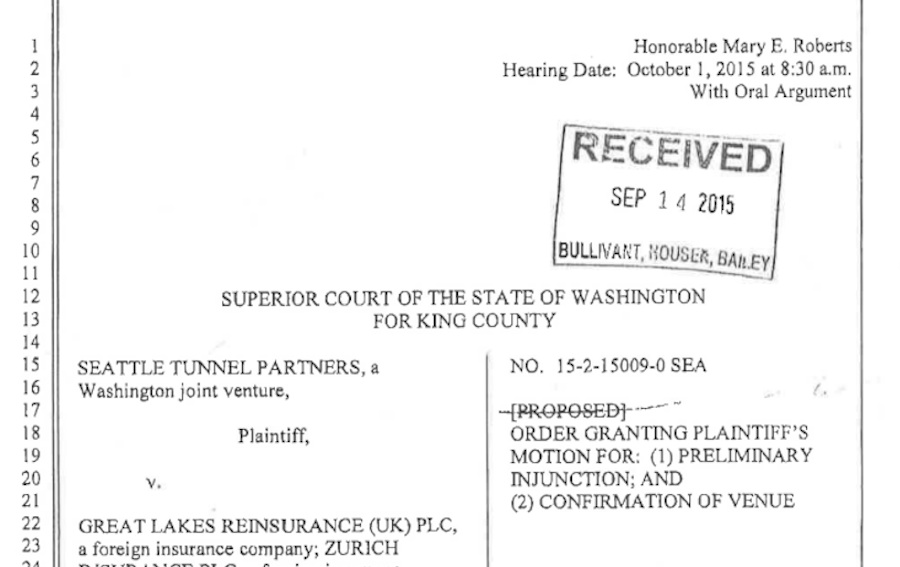The first round in the battle of Bertha—the one over insurance coverage—goes to the contractor.
A State Supreme Court Judge in New York City ruled in October that a multimillion-dollar insurance dispute involving Bertha, the giant tunnel boring machine that had been stuck under the streets in Seattle, should stay in Washington State.
A Superior Court Judge in Seattle followed up the New York ruling with a preliminary injunction last month aimed at heading off further legal maneuvers in New York.
The rulings are good news for Seattle Tunnel Partners (STP), a joint venture between Dragados USA Inc. and Tutor Perini Corp.
Together, the decisions give STP the equivalent of home court advantage as the Seattle tunnel venture tries to force insurers to make good on an $85-million builders’ risk policy to pay some of the costs of Bertha’s repairs.
Bertha is finally back underground and new tunneling may be only days away, the first in over a year.
The legal wrangling over the insurance dispute is just ramping up, too.
The forum rulings amount to an important strategic blow to a consortium of insurers, including Great Lakes Reinsurance and Zurich Insurance, which had pushed to have the case heard in New York State. The insurers are represented by the Seattle-based law firm Bullivant Houser Bailey.
An Early Test
Forum selection is a crucial factor in construction disputes, and in the case of Bertha, the insurance claim is an early test of some of the more basic, underlying issues that will be in play in possible litigation between the contractor and state transportation officials over who is at fault, and therefore on the line for many million of dollars of repairs and cost overruns. The stakes are already high, with the repair bill for Bertha estimated at $143 million.
But the different types of dispute are not exactly the same. In forum selection, contract language specifying where a dispute will be resolved sometimes is overturned by a judge who makes a determination based on state law or public interest.
As far as the insurers’ affection or New York’s legal system, their feeling turned out to be unrequited.
In a blow to the insurers, a New York judge back in October all but pulled the plug on further action there.
New York State Supreme Court Justice Saliann Scrarpulla opted to temporarily freeze any further action in his court while deferring to his judicial counterparts in Washington to settle where the case should be heard.
The insurance consortium had filed a lawsuit in New York in August arguing Bertha’s problems had to do a faulty, “underdimensioned” design, and therefore were not covered by the policy.
The filing, in turn, was in response to the Seattle tunnel contractor’s lawsuit back in June in Washington seeking to force insurers to ante up tens of millions in payments under the policy.
The contractor is represented by two law firms, Dingess, Foster, Luciana, Davidson & Chleboski, and Gordon Tilden Thomas & Cordell.
Those attorneys have argued that Bertha broke down after hitting a steel pipe, which would be covered under the policy.
Reluctant Judge
The judge in New York seemed not to want to decide the forum issue.
“I am not fighting with the Washington court. No way. No how. Let the Washington court decide. That’s the court that this was brought in first,” Scrarpulla, the New York State Supreme Court judge declared, according to a transcript of the hearing.
“I’m not going to have a duel, a battle of New York courts versus Washington courts,” he said.
And when an attorney for the insurers accused the Seattle tunnel contractor of “forum shopping” in a bid to get a more sympathetic hearing in a local court, Scrarpulla was having none of it.
“I don’t want your spin,” the judge chided. “I want you to answer the question correctly and succinctly: Where was the first action between these parties filed?"
The attorney for the insurers answered “Washington.”
Scrarpulla then asked where the first action seeking a decision on the venue was filed, a question that momentarily stumped the attorney for the insurers.
“I’m trying to think, your honor,” he answered. “There’s so many.” After pausing, he says simply, “I don’t know how to answer that question.”
To which Scrarpulla replied, “Well, I hear it's Washington.”
No minor detail, this simple fact turned out to be a key factor in the contractor’s successful bid to have the $85 million insurance dispute fought out in Washington rather than in New York courts.
Under Washington state law, a plaintiff who files his case first in the state has the right to have it heard there. The contractor filed its complaint in June.
The insurers, by contrast, first filed their lawsuit in August in New York.
Policy Language
Still, the insurers argued the builder’s risk policy has a provision calling for any dispute over coverage to be settled in the New York court system.
But lawyers for the STP, the contractor, countered that the New York provision is immediately contradicted by the phrase, “each party agrees the exclusive jurisdiction of any competent court in the United States of America.”
Moreover, the contractors’ legal team argued the New York provision is also contradicted in the policy’s “suit of service” provision:
“It is agreed that in the event of the failure of the Insurers to heron pay any amount claimed … the Insurers hereon, at the request of the insured, will submit to the jurisdiction of the Court of a competent jurisdiction within the United States.”
Of course, it’s just the first round of what could prove to be a very long case.
In recent weeks, the skirmishing in state court in Seattle has erupted anew over Washington State Superior Court Judge Mary Roberts’ preliminary injunction last month, sought by STP, preventing the insurers from continuing to seek relief in a New York Court.
-with Richard Korman





Post a comment to this article
Report Abusive Comment